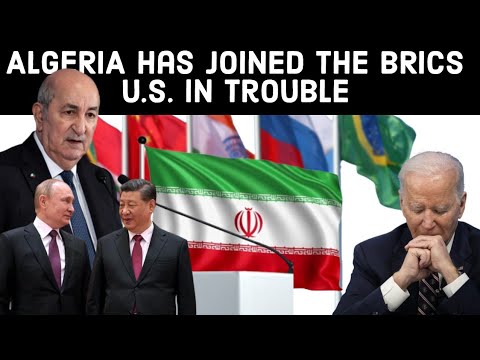
BRICS – ALGERIA’s Signing almost complete
Keep up to Date & Bypass the Big Tech Censorship
Get uncensored news and updates, subscribe to our daily FREE newsletter!
Algeria, Africa’s largest natural gas exporter, is making the most of a new era in great-power rivalry and an ongoing energy crisis.
Having officially applied in November 2022 to join the Brics group of emerging economies (Brazil, Russia, India, China, and South Africa), Algerian President Abdelmadjid Tebboune’s administration signed up shortly after to extend Belt and Road Initiative projects with China on infrastructure, energy, and space exploration.
Algeria is now a vital gas supplier to Europe since Russia’s invasion of Ukraine, Algeria’s windfall profits from energy exports exceeded $50 billion last year, up from $34 billion in 2021 and just $20 billion in 2020. But it has found itself a target of Washington’s demands that allies cut economic ties with Russia regardless of their own sovereign interests.
| Recommended Books [ see all ] | ||||
|---|---|---|---|---|
 |  |  |  |
 |
“There is no sugarcoating it, Algeria’s growing relationship with Russia poses a threat to every nation across the globe,” said U.S. Rep. Lisa McClain upon the release last September of a letter signed by her and 26 other lawmakers and addressed to U.S. Secretary of State Antony Blinken.
“[In 2021] alone, Algeria finalized an arms purchase with Russia that totaled over $7 billion. In this deal, Algeria agreed to purchase advanced Russian fighter aircraft, including Sukhoi 57. The United States needs to send a clear message to the world that the support for Vladimir Putin, and his regime’s barbaric war efforts will not be tolerated,” the lawmakers wrote.
Reluctant to endanger security and trade ties with Beijing and Moscow, Algeria has sought to join Brics in order to chart its own foreign policy more easily while protecting its growing economic opportunities as an energy exporter. Its fellow Arab League members Saudi Arabia and Egypt have also expressed interest in joining Brics.
China has been the main exporter to Algeria since 2013, displacing former colonial power France, and the pair signed a second five-year strategic cooperation pact earlier in November. Meanwhile, Russia supplies around 80 percent of Algeria’s weapons, making Algeria Russia’s third-largest arms importer, after India and China. Algiers and Moscow held joint military exercises near the Moroccan border in November.
It comes as no surprise that Beijing and Moscow have welcomed the application. Russian Foreign Minister Sergey Lavrov visited Algeria in May 2022, and during Chinese President Xi Jinping’s state visit to Saudi Arabia last month, he met with Algerian Prime Minister Aymen Benabderrahmane, and the pair vowed to further strengthen relations.
“Algeria would definitely like to join Brics. The question is whether we will be accepted, because there are certain obligations. We need to bring some of our legislative acts to a common standard,” Algiers Gov. Mohamed Abdenour Rabehi told the Russian state news agency Sputnik last month.
Only three weeks ago, Sonatrach, Algeria’s state-owned oil company, and the German gas company VNG signed a contract for the construction of the first green hydrogen plant in Algiers, which will produce 50 megawatts of electricity from solar energy. Algeria is also gearing up to sell its spare electricity capacity to Europe while pushing to double gas exports to reach 100 billion cubic meters per year, compared with 56 billion cubic meters per year in 2022, Tebboune told reporters.
At the U.S.-Africa Leaders Summit in Washington last month, Tebboune was noticeably absent, preferring to send Benabderrahmane instead as his administration carefully crafts a “neutral” stance in world diplomacy to avoid being drawn into Washington’s criticisms of Russia or Algeria’s authoritarian leadership.


